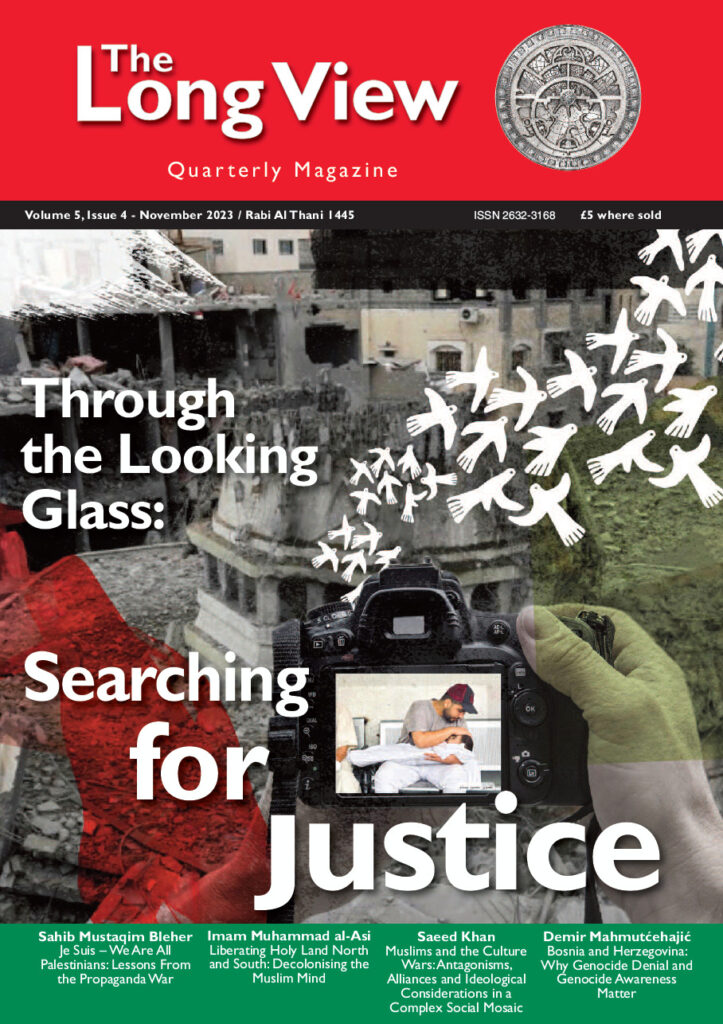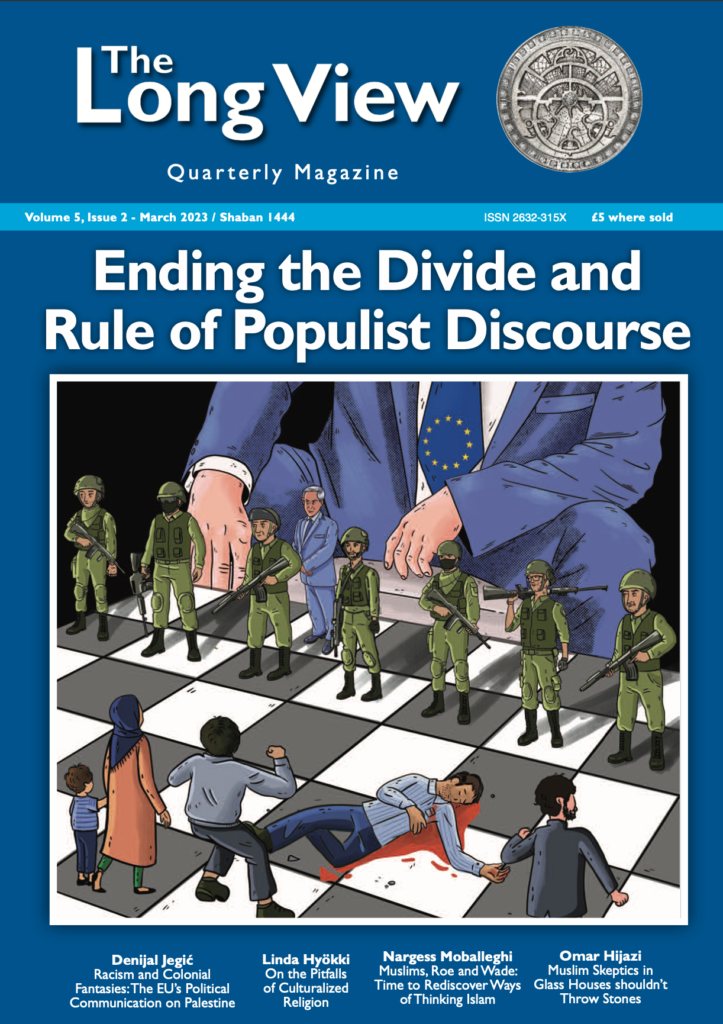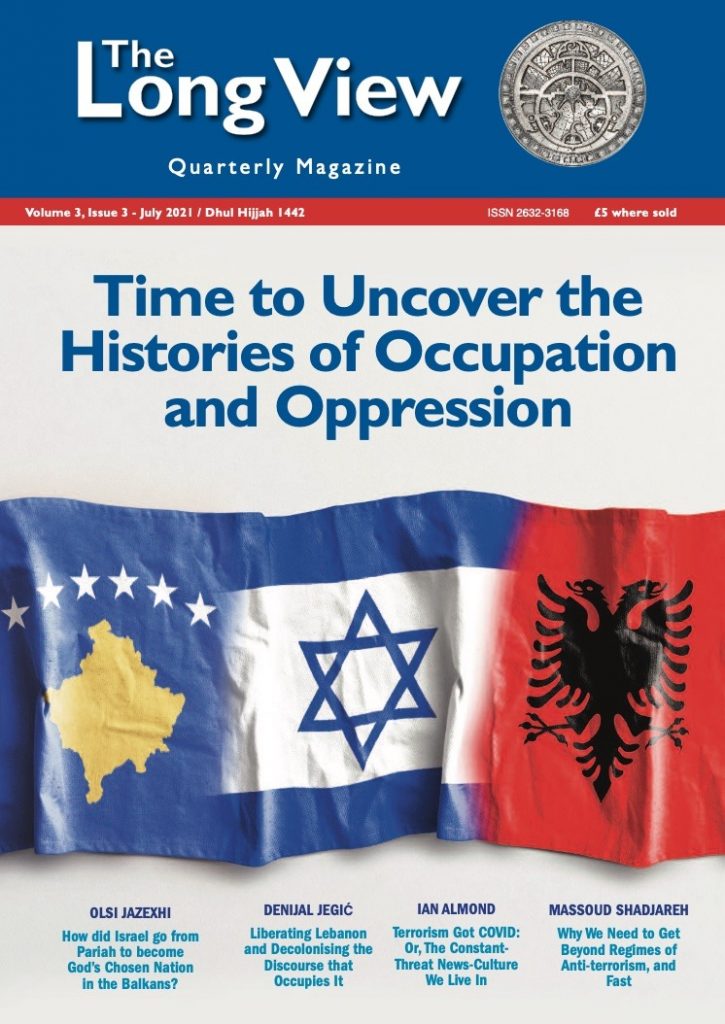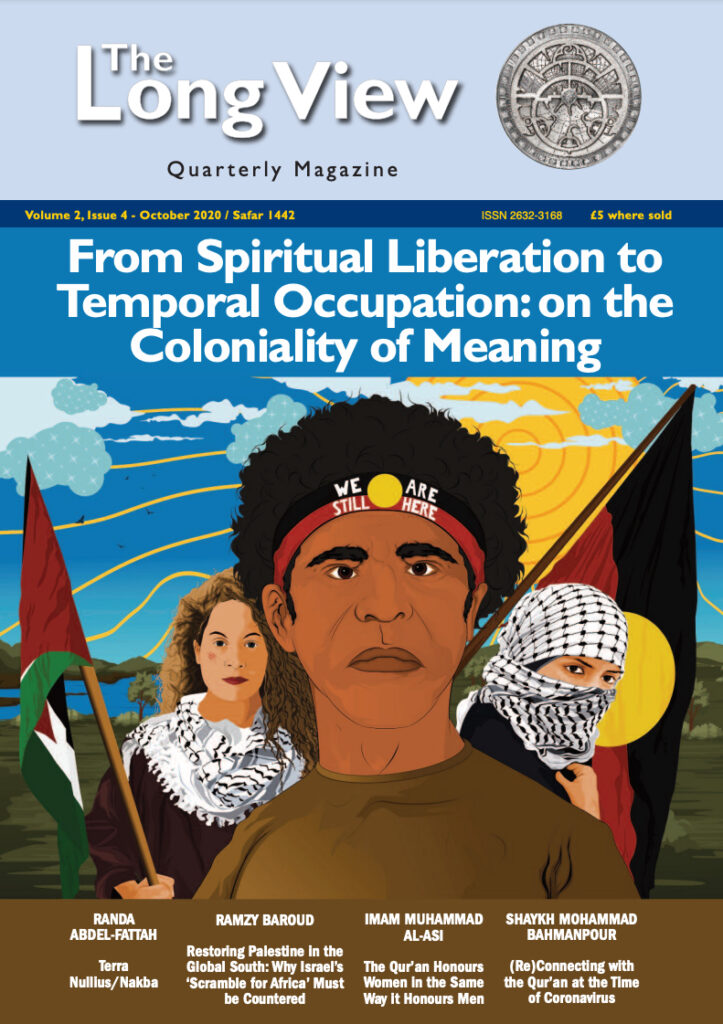 This is a quick reminder that the latest issue of The Long View, ‘Through the Looking Glass: Searching for Justice’ is available to read online.
This is a quick reminder that the latest issue of The Long View, ‘Through the Looking Glass: Searching for Justice’ is available to read online.
Two of the essays focus on Palestine and how critical thinking and praxis can help liberate both Palestinians and those of us who support them and all oppressed peoples.
In Je Suis – We Are All Palestinians: Lessons from the Propaganda War Sahib Mustaqim Bleher calls on Muslims and all those of good conscience, to move beyond the framing of Palestine as dictated by the mainstream westernised media, as both individuals and societies.
In Liberating Holy Land North and South: Decolonising the Muslim Mind Imam Muhammed al-Asi contends that the characteristics of Bani Israel as outlined extensively in the Qur’an, are to be found in the Muslim mind, psyche and collective action. Understanding this is key to liberating not just the Holy Land but for the establishment of justice for all peoples, but to liberating the minds of all those struggling for freedom and justice, particularly Muslims.
The importance of Palestine to people around the world cannot be underestimated. Many people see their own struggles against oppression through the lens of Palestinian liberation. The Long View features many contribution on Palestine. Find some of these below.

Racism and Colonial Fantasies: The EU’s Political Communication on Palestine Denijal Jegić unpacks the European Union’s proclamations on Palestine, arguing that the racism contained therein are not exceptional, but foundational to European ideas of itself.
P alestine Beyond the War on Terror: Mistakes, Challenges and Prospects Palestinian leadership’s adaptation to a world where the claims to US hegemony are decentralised is an urgent and overdue project, argues Ramzy Baroud.
alestine Beyond the War on Terror: Mistakes, Challenges and Prospects Palestinian leadership’s adaptation to a world where the claims to US hegemony are decentralised is an urgent and overdue project, argues Ramzy Baroud.

How did Israel go from Pariah to become God’s Chosen Nation in the Balkans? Olsi Jazexhi looks at the often overlooked history of pro-Palestinian sentiment and pro-Israel lobbying in the Balkans. This history, he argues, is an essential portent for other countries.

Terra Nullius/Nakba The political and academic discourse on colonised countries is deliberately framed in such a way that it problematises the victim while exonerating and legitimising the villain. This has involved rewriting the historical record, a sine qua non of European colonialism, and for us to confront it requires challenging it and recognising the colonial matrix that binds the oppressors together, argues Randa Abdel-Fattah.
The Long View on Palestine
Two of the essays focus on Palestine and how critical thinking and praxis can help liberate both Palestinians and those of us who support them and all oppressed peoples.
In Je Suis – We Are All Palestinians: Lessons from the Propaganda War Sahib Mustaqim Bleher calls on Muslims and all those of good conscience, to move beyond the framing of Palestine as dictated by the mainstream westernised media, as both individuals and societies.
In Liberating Holy Land North and South: Decolonising the Muslim Mind Imam Muhammed al-Asi contends that the characteristics of Bani Israel as outlined extensively in the Qur’an, are to be found in the Muslim mind, psyche and collective action. Understanding this is key to liberating not just the Holy Land but for the establishment of justice for all peoples, but to liberating the minds of all those struggling for freedom and justice, particularly Muslims.
The importance of Palestine to people around the world cannot be underestimated. Many people see their own struggles against oppression through the lens of Palestinian liberation. The Long View features many contribution on Palestine. Find some of these below.
Racism and Colonial Fantasies: The EU’s Political Communication on Palestine Denijal Jegić unpacks the European Union’s proclamations on Palestine, arguing that the racism contained therein are not exceptional, but foundational to European ideas of itself.
P alestine Beyond the War on Terror: Mistakes, Challenges and Prospects Palestinian leadership’s adaptation to a world where the claims to US hegemony are decentralised is an urgent and overdue project, argues Ramzy Baroud.
alestine Beyond the War on Terror: Mistakes, Challenges and Prospects Palestinian leadership’s adaptation to a world where the claims to US hegemony are decentralised is an urgent and overdue project, argues Ramzy Baroud.
How did Israel go from Pariah to become God’s Chosen Nation in the Balkans? Olsi Jazexhi looks at the often overlooked history of pro-Palestinian sentiment and pro-Israel lobbying in the Balkans. This history, he argues, is an essential portent for other countries.
Terra Nullius/Nakba The political and academic discourse on colonised countries is deliberately framed in such a way that it problematises the victim while exonerating and legitimising the villain. This has involved rewriting the historical record, a sine qua non of European colonialism, and for us to confront it requires challenging it and recognising the colonial matrix that binds the oppressors together, argues Randa Abdel-Fattah.
Help us reach more people and raise more awareness by sharing this page
Featured Campaigns
Trending Posts
IHRC responds to Telegraph/UKLFI smear attempt against Islamic summer camp
IHRC letter to Watford Council re UKLFI attack on Muslim summer camp
Letter to Brent council re UKLFI attack on Islamic summer camp
Letter to Telegraph re UKLFI attack on Muslim summer camp
Demonstration for Palestine and Iran